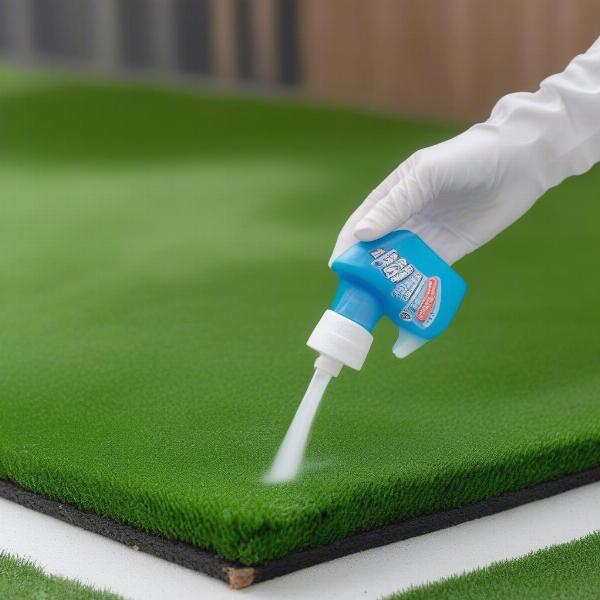Dog urine on artificial turf can be a smelly and frustrating problem. While artificial grass offers convenience and low maintenance, it doesn’t eliminate the challenges of pet waste, especially the lingering odor of urine. This article provides practical solutions for cleaning and preventing dog urine issues on your artificial turf, ensuring a fresh and hygienic environment for both you and your furry friend.
Understanding the Problem: Why Dog Urine Smells on Artificial Turf
Unlike natural grass, artificial turf doesn’t absorb liquids. Urine sits on the surface and within the infill, creating a breeding ground for bacteria. This bacterial activity is the primary source of the unpleasant ammonia-like odor. Heat exacerbates the smell, making it even more noticeable in warmer climates. Additionally, the artificial materials can trap the uric acid crystals, contributing to the persistent odor.
Cleaning Up Dog Urine: Effective Methods and Solutions
Cleaning dog urine from artificial turf involves more than just rinsing with water. Here are some effective cleaning methods:
- Regular rinsing: Hose down the area regularly, especially after your dog urinates. This helps dilute the urine and wash away some surface bacteria.
- Enzyme cleaners: These specialized cleaners break down the uric acid crystals, eliminating the source of the odor. Follow the product instructions carefully for best results.
- DIY cleaning solutions: A mixture of equal parts water and white vinegar can also help neutralize odors. Spray the solution onto the affected area and let it sit for a few minutes before rinsing thoroughly.
- Baking soda: Sprinkle baking soda on the turf to absorb odors. Let it sit for a few hours, then rinse with water.
 Cleaning artificial turf with enzyme cleaner
Cleaning artificial turf with enzyme cleaner
Preventing Urine Odor: Proactive Strategies
Prevention is key to maintaining a fresh-smelling artificial lawn. Here are some proactive strategies:
- Designated potty area: Train your dog to use a specific area of your yard, preferably one that is easy to clean, such as a gravel patch or a designated area of real grass.
- Increased water intake: Encourage your dog to drink more water. This will dilute their urine, making it less concentrated and less pungent.
- Dietary adjustments: Consult your veterinarian about dietary changes that may help reduce the concentration of uric acid in your dog’s urine.
- Artificial turf deodorizers: Several products are specifically designed to neutralize odors in artificial turf. These can be used regularly to maintain freshness.
How to Choose the Right Enzyme Cleaner
Not all enzyme cleaners are created equal. Look for a product specifically formulated for pet urine and artificial turf. Consider factors such as effectiveness, safety for pets and the environment, and ease of use.
Is it Safe to Use Bleach on Artificial Turf?
While bleach can be a powerful disinfectant, it is generally not recommended for use on artificial turf. It can damage the fibers and discolor the grass.
How Often Should I Clean My Artificial Turf?
Regular rinsing with water is recommended, especially in areas where your dog frequently urinates. Deep cleaning with an enzyme cleaner or DIY solution should be done every few weeks or as needed.
Conclusion
Addressing dog urine on artificial turf requires a proactive approach. By understanding the cause of the odor and implementing effective cleaning and prevention strategies, you can keep your artificial lawn fresh, hygienic, and enjoyable for both you and your pet. Regular cleaning and preventative measures are essential for maintaining a pleasant and odor-free outdoor space.
FAQs
- Why does my artificial turf smell like dog urine even after cleaning? The urine may have penetrated the infill. Try a deeper cleaning with an enzyme cleaner.
- Can I use vinegar and baking soda together on artificial turf? Combining vinegar and baking soda creates a less effective cleaning solution. Use them separately.
- What’s the best way to train my dog to use a designated potty area? Positive reinforcement with treats and praise is usually effective.
- Are there specific types of artificial turf that are better for dogs? Yes, some turf varieties have better drainage and antimicrobial properties.
- Can dog urine damage artificial turf? Over time, excessive urine can discolor or degrade the turf fibers.
- Is it safe for my dog to play on artificial turf that has been treated with enzyme cleaner? Most enzyme cleaners are safe for pets once dry. Choose a pet-friendly option.
- What if I’ve tried everything and the smell persists? Consult a professional artificial turf cleaning service for specialized treatment.
Related Articles:
About ILM Dog:
ILM Dog is your trusted resource for all things canine. We offer expert advice on dog breeds, health, training, nutrition, grooming, and much more. From puppy care to senior dog support, we’re here to help you navigate every stage of your dog’s life. Our expertise extends to product recommendations and insightful reviews, helping you make informed decisions about your dog’s well-being. Contact us at [email protected] or +44 20-3965-8624. We look forward to hearing from you!